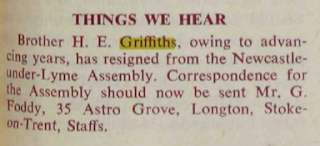As with all family ancestors, I sent out what I called "Ancestor Templates" to family members who were still alive and might remember them, or stories about them. This particular template was answered and filled out by his son, my Uncle Michael.
General Information
Name of person answering: Mike Hilton
Relation to ancestor: Son
Name of Ancestor: Ernest Frederick Hilton
Name of ancestor’s parents and siblings: George Hilton and Clara Hilton nee Drakeley
Siblings were: Jessie Irene; Winifred May; George Stanley; Kenneth; Maurice; Evelyn Joyce.
Please note that I have birth and death details for most.
General Facts
Birth Date: 11th August 1923
Address/es: Spinning School Lane Tamworth, Edward Street Tamworth, Barcroft St Cleethorpes and finally 55 Richmond Road, Cleethorpes. There may have been others when he was in the Navy. He was stationed at Hartlepool before moving to Grimsby. I also believe he stayed with Phyllis Hedison when he first came to Cleethorpes. She was May’s friend and made the cake for their wedding.
Date of death: 24th March 2003.
Physical appearance
Height: 5' 10''
Hair colour: Dark or black? Turned white instead of grey when he was older.
Eye colour: Not sure
Anything else distinctive? He did have a large nose which was typical of the Drakeley side of the family.
Memories
What was their favourite food? He ate anything and everything. He always finished off food that needed eating and I remember him having bread and dripping. Nothing special though.
What was their favourite pastime? Like May, he enjoyed gardening. Like me he was not very good at DIY even though he did try carpentry in early days after the war. He enjoyed sport and had played football until he broke his leg playing for the Post Office. In later years he took up Bowls and the club instituted a prize in his name. Christine and I attended the celebration. He liked watching sport but it was not an obsession with him. He even started a computer course with Auntie Edna Timpson. Mum and Dad used to play tennis when younger.
What did they like to read (If anything)? He was not a great reader but obviously the Bible and papers.
What is your favourite memory of them, when did it happen? There are many. I was always closer to my Mum when younger but after May died he came out of his shell and loved seeing his grandchildren and nieces etc.
What are some things you did together and when? Holidays most years, and of course going to church at Elim. He did go to the football once but that was enough. After Mum died he loved coming to Kenilworth
Can you share one funny story? There were quite a few. One holiday we came across a written statement on the beach that said Ernest was a lump. it obviously wasn't him but we teased him a lot. Trying to follow road directions was not easy (Chris interjected that she always remember when they went on Holiday that May would get annoyed because he always got lost.) for him and once he left the car on a patch of green in Skegness only to find on return there was a cricket match going on around it.
Can you share one serious story? When he came to Kenilworth he stayed in Bed and breakfast and the last time I saw him he was looking out of the window waiting for me to pick him up. For some reason I felt very sad for him and now I know why. Also not long after Mum died he stayed with Maurice in Southwold and was taken ill. What I didn't know was that he was diagnosed with a heart problem and was advised to have an operation. He chose not to and never let us know. Whether he was frightened, didn't want to worry us or just didn't want to prolong his life we will never know.
What was your favourite thing about them? His patience with Mum. She was often ill as you know and took her frustrations out on him at times. He rarely let it get to him and although he knew he was not her intellectual equal he was most times happy and loved her very much.
Here are some of the pictures that Uncle Michael has also been able to provide.
 |
| Circa 1944 |
 |
| Ernest and May in front of the Humber Bridge, which joined the north and south side of the river Humber in the U.K. |
 |
| Ernest and his son Michael. |
 |
| Ernest playing the accordion |
Other notes:
1. Uncle Michael is the genealogist of this side of the family. He has done a lot of research on Ernest's side of the family. Many of my notes, stories and pictures from this side of the family come from Uncle Michael.
2. I love that addresses are provided. The 1921 census is not accessible by the public until 2021. I have not yet researched the pre WW2 survey that was done of the U.K, therefore these addresses are the best I can find of their location.
3. It is interesting that Grandad only went to on football game. From what Uncle Michael has told me, he actually helped build the foundation of the Grimsby Town stadium at Blundell Park. The atmosphere at a typical football game in the U.K is very different to American sports games which tend to have a much more family friendly atmosphere.














